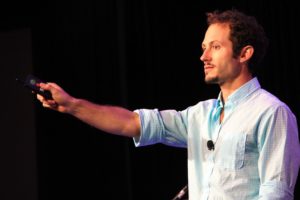
At the time, Facebook was a one-year-old company with only a few million users. The company was growing rapidly, adding 50,000 new users per day.
Noah joined the team as product manager. He made a base salary of $60,000 plus 0.1 percent of ownership, equivalent to 20,000 shares.
His stock options would have been worth $170 million if he’d cashed out in 2014, he says.
But he didn’t see a dime.
In June 2006, merely 9 months after he started working at Facebook, Noah got fired. Instead of making $170 million, he made zero.
He fell into a deep depression for a year. Then he rescued himself by starting his own company.
He became a serial entrepreneur. He tried his hand at a lot of things — including developing Facebook games, selling discount cards, creating a payment processor in the gaming space — but he’s best known for his two most successful companies.
In 2010 he started a company, AppSumo, which offers daily deals on software for small businesses. It’s like Groupon for online entrepreneurs. By 2012, AppSumo was grossing $4 million per year in revenue, with annual net profits of $500,000.
Yet Noah wasn’t fulfilled. So he pivoted. He offloaded the day-to-day management of the company to a colleague, and in 2015 he started a sister company, Sumo.com, which develops marketing tools for websites and online businesses.
In today’s episode, Noah and I discuss reflections on business, money and life.
Enjoy!
Here are eight key takeaways from our conversation:
#1: Take Action
Noah emphasizes the importance of taking action, rather than overthinking. He says:
“I just started doing things. I think a lot of people that want to have a side hustle … they’re just like, reading the books about it and they’re listening to the podcasts but they don’t do sh*t.”
Stop thinking and start doing. You can only read books and lsiten to podcasts up to a point, before these stop being beneficial. Try learning through experience.
Figure out one step you can take today.
You can start small.
#2: Solve Your Own Problems
Entrepreneurs often wonder how they can serve their audience. But what if they shifted that focus to solving their own problems?
“I [thought], I just want to get cool software to run my company. And then I was like, well, what if I can just promote the software and get a deal on it?”
Noah wanted software he could use to improve his businesses. He solved his own problem, and then he sold that solution to other business owners. That’s how he started Appsumo.
Noah had the same mindset when he launched Sumo.com, as well. He wanted to make collecting email addresses easier. He solved his own problem, and then provided this solution to other entrepreneurs. Boom.
#3: Build Relationships by Helping Others
Networking doesn’t work if it’s a one-way street. You can build relationships by helping others, rather than making requests.
“I went out of my way to figure out two things. Number one, who can I go and help?
“The second thing … when I see something that impresses me in any level from a website to a book to anything, I just reach out to the person.”
If you ask for favors, but don’t offer any help, you won’t build strong relationships. Focus on giving back.
Be genuine in your attempts to help others. If you admire someone, let them know that you appreciate their work.
#4: Stay True to Your Vision
Noah ignores the question: What’s prestigious?
Instead, he asks: What’s enjoyable?
“I don’t have an ambition to go public. I don’t have an ambition to be a billionaire. I think it just has to be genuine. And what is genuine, right? Like what is your true self? It’s just doing what you want to do.”
You might feel pressure to follow the crowd.
Yeah, you can build a $50 million business, but at what cost? It’s dangerous to think that the grass is always greener if you grow bigger.
You don’t need to play the same game as everyone else. Play by your own rules.
#5: Ask Yourself: What Would You Do for Free?
How would you fill your days if money wasn’t an issue? What work would you do for free? What are you so fired up about that money isn’t a motivator?
You can use your answer to figure out what’s next.
“I’ve made the most money and had the most fulfillment when I’ve just done the things I really wanted without the intention of just trying to make money. I think when I’ve put the money first is when I’ve made the least money or it’s been the fastest to quit.”
How can you continue challenging yourself?
Brainstorm ideas. Then ask yourself how you can incorporate these into your life now.
Maybe you enjoy the game. Your goal isn’t money, per se, but you love strategizing about business. How might this influence your decisions?
#6: Ask Yourself: How Would You Live if You Had $100 Million?
Noah says:
“If you really wanted to do whatever you wanted … what does that look like? … how do you live like you have a hundred million dollars … if I’m not doing anything congruent with that … what do I want to change?”
What’s your first answer?
How can you start now?
This question can help you sharpen your understanding of your priorities. It can also help you overcome mental blocks and limiting beliefs.
#7: Optimize the Upside
If you drive 30 minutes across town in order to save a few dollars, you’re wasting your time. Those few bucks aren’t going to move the needle on your financial life.
That penny-pinching isn’t moving the right needle. Focus on growth.
“I was trying to optimize the ‘unsubscribe’ page on Appsumo and [my friend says] – ‘so let me get this straight. You’re spending a week of your time … to optimize the page for the people who already want to leave? Why don’t you try to optimize the people who want to stay? Why don’t you try to optimize the upside instead of just reducing the downside? Because there’s a limit to how much you can reduce on the downside. But there’s no limit to the upside.'”
Think about the age-old debate between earning more vs. spending less. This is a debate about optimizing the upside vs. managing the downside.
You can only reduce your spending to a limit. When you focus on frugality, you’re managing the downside.
By contrast, your potential income is unlimited. When you focus on growth, you’re optimizing the upside.
Yes, frugality is important. It’s necessary, but it’s not sufficient. Optimize the upside, as well. Are you spending your energy in the right place? Or could your time be better spent on actions that could scale?
Noah elaborates:
“How do you just try to do more things that compound? … how do I do more things that, once I’ve gotten it … keeps making everything else better.”
You could spend your limited time helping people one-on-one. Or you could “turn yourself into software,” as Noah describes, so your impact is scalable.
#9: Financial Independence is the Ability to Choose
Noah provides commentary on the Financial Independence Retire Early (FIRE) movement:
“I don’t know if it’s the ‘retire early’ [part] that’s interesting. My parents retired and it looks really boring. I think people just want independence. What people really, really want is the ability to choose.”
Most people want to choose how they spend their days, rather than feel like this decision has been chosen for them by society and circumstance.
Resources Mentioned:
- Sumo.com
- Appsumo.com
- Kingsumo.com
- Okdork.com
- Things the Rich Don’t Want You To Know, by Noah Kagan (Tax info)
- How I Lost 170 Million Dollars, by Noah Kagan (Noah’s book on time at FB)
- MyBodyTutor.com
- KopywritingKourse.com
- Your First Rental Property VIP List
Thanks to our sponsors!
Ancestry
Have you ever wanted to know your family’s origin story? Where they lived, and how you’re all connected? Ancestry allows you to do exactly that – trace your ancestors’ journeys over time, and build a tree so that your ancestors become more than just a name. For 20% off an AncestryDNA kit, go to ancestry.com/paula.
Skillshare
Skillshare is an online learning community with more than 30,000 classes in areas like entrepreneurship, freelancing, and technology. Take your skills to the next level so you can earn more – grab 2 months of Skillshare for free at skillshare.com/paula.
SoFi
Want to dip your toes into investing, or teach your kids how to invest? SoFi’s platform lets you invest in some of the biggest companies with as little as $1, with zero fees. You don’t have to own a whole share – instead, SoFi has Stock Bits that you can use to buy fractional shares. Get started at sofi.com/paula and get $25 of mystery stock for free!

Rothy’s are great for travel!
Rothy’s shoes are stylish, sustainable, and comfortable for every day wear, anywhere. They come in four styles, their lineup is updated often, and I love that they make flats from recycled plastic water bottles! If you want to order a pair, go to rothys.com/paula.
Photo credit: Betsy Weber